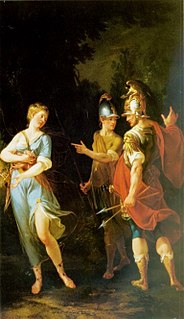Related Research Articles
In Greek mythology, Phegeus was the name of the following characters:

In the Aeneid of Virgil, Achaemenides was a son of Adamastos of Ithaca, and one of Ulysses's crew. He was marooned on Sicily when Ulysses fled the Cyclops Polyphemus, until Aeneas arrived and took him to Italy with his company of refugee Trojans.

Latinus was a figure in both Greek and Roman mythology. He is often associated with the heroes of the Trojan War, namely Odysseus and Aeneas. Although his appearance in the Aeneid is irreconcilable with his appearance in Greek mythology, the two pictures are not so different that he cannot be seen as one character.
In Roman and Greek mythology, Capys was a name attributed to three individuals:
In Greek mythology, Coroebus may refer to two distinct characters:
In Greek mythology, the name Halaesus or Halesus may refer to:

In Greek and Roman mythology, Iapyx, Iapux or Iapis was a favorite of Apollo. The god wanted to confer upon him the gift of prophecy, the lyre, etc.; but Iapyx, wishing to prolong the life of his father, preferred the more tranquil art of healing to all the others.
In Greek and Roman mythology, Achates may refer to the following personages:
There are several characters named Acmon or Akmon in Greek mythology:
In Roman mythology, the Aeneads were the friends, family and companions of Aeneas, with whom they fled from Troy after the Trojan War. Aenides was another patronymic from Aeneas, which is applied by Gaius Valerius Flaccus to the inhabitants of Cyzicus, whose town was believed to have been founded by Cyzicus, the son of Aeneas and Aenete. Similarly, Aeneades was a patronymic from Aeneas, and applied as a surname to those who were believed to have been descended from him, such as Ascanius, Augustus, and the Romans in general.
Mimas was a Greek mythological character who appears in Virgil's Aeneid. He was the son of Amycus and Theano. A noble Trojan, he accompanied Aeneas to Italy, where he was killed by Mezentius.
In Greek mythology, the name Ilioneus may refer to:
In Greek mythology, Thalia or Thaleia was one of the fifty Nereids, marine-nymph daughters of the 'Old Man of the Sea' Nereus and the Oceanid Doris. Her name was derived from θάλλειν thállein which means "to flourish, to be green".

In Greek mythology, Creusa was the daughter of Priam and Hecuba. She was the first wife of Aeneas and mother to Ascanius.

In the Aeneid, Achates was a close friend of Aeneas; his name became a by-word for a very intimate companion.

In Virgil's Aeneid, Androgeos or Androgeus was a Greek soldier, who during the sack of Troy in the middle of the night mistook Aeneas and his group of Trojan defenders for a Greek raiding party, paying for this mistake with his life. Afterwards, Aeneas's companion Coroebus dressed in Androgeos's armor in order to fool more Greek soldiers to their demise, only to be the first among Aeneas's disguised group to die.
In the Aeneid of Virgil, Abaris was a warrior of Turnus, the man who resisted the Trojan hero, Aeneas in Italy. He was killed by Euryalus, in the battle between the Trojans and the Rutuli.
In Greek mythology, Amykos, Latinized as Amycus, may refer to the following personages:
In Greek mythology, Spio was one of the 50 Nereids, marine-nymph daughters of the 'Old Man of the Sea' Nereus and the Oceanid Doris. Variations of her name were Speio and Speo.
In Greek mythology, Demoleus or Demoleos was an Achaean warrior who participated in the Trojan War.
References
- Publius Vergilius Maro, Aeneid. Theodore C. Williams. trans. Boston. Houghton Mifflin Co. 1910. Online version at the Perseus Digital Library.
- Publius Vergilius Maro, Bucolics, Aeneid, and Georgics. J. B. Greenough. Boston. Ginn & Co. 1900. Latin text available at the Perseus Digital Library.